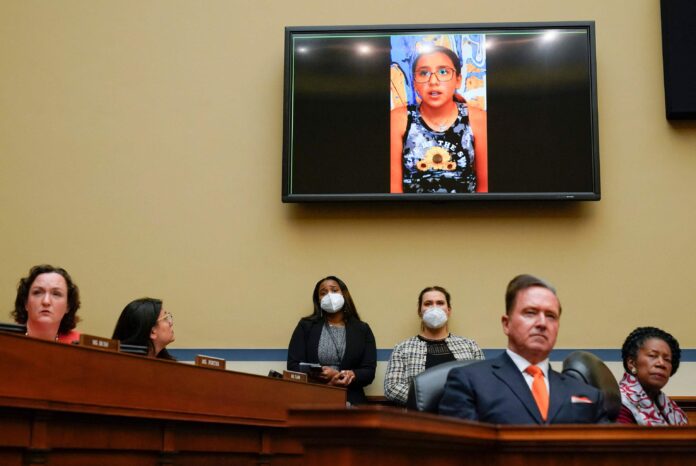An 11-year-old girl told U.S. lawmakers Wednesday that she smeared the blood of her slain classmate next to her to play dead during the Texas school shooting that rocked the country.
Miah Cerrillo, a fourth grader at Robb Elementary School in Uvalde, Texas, recounted in terrifying detail when 19 of her classmates and two teachers were shot on May 24 by an 18-year-old.
She remembered that they had been watching a movie and when the gunman barged in they took cover behind the teacher’s desk and their backpacks.
“He told my teacher ‘goodnight’ and then he shot her in the head. And then he shot some of my classmates and the blackboard,” Miah said in a prerecorded video intervention.
“When I went to the backpacks, he shot my friend who was next to me and I thought he was going to go back into the classroom, so I took some blood and smeared it all over my body.”
Miah recounted being completely silent, grabbing her dead teacher’s cell phone as soon as she could and dialing 911. “I told them we needed help, and to see the police in our classroom,” she said.
Police in Uvalde have come under fire after it emerged that more than a dozen officers waited outside and did nothing as children lay dead or dying.
When asked what she wanted to happen after the attack, Miah replied, “Have security,” confirming that she feared another gunman would attack her school. “I don’t want it to happen again,” she said.
Miah, whose account of the massacre left some lawmakers in tears or in disbelief, has nightmares and is still recovering from bullet fragments in his back and dealing with trauma, said his father, Miguel Cerrillo. “She’s not the same girl she used to play with,” he told the committee.
His testimony comes as Congress faces mounting pressure to respond to rising gun violence across the country, especially in the form of mass shootings (incidents with at least four dead or wounded, not including the shooter).
The massacres at Miah’s school and, 10 days earlier, at a supermarket in Buffalo, upstate New York, reignited urgent calls for action by politicians.
The House Oversight and Reform Committee also heard from the mother of Lexi Rubio, a fourth-grade student at Robb Elementary School who was killed.
“We don’t want you to think of Lexi as a number. She was smart, compassionate and athletic,” Kimberly Rubio said by video conference, wiping away tears with her husband Felix.
“She was quiet, shy, unless she had something to say. When she was right, as she often was, she stood her ground. She was firm, direct, with an unwavering voice. So today we stand up for Lexi and as her voice, we demand action.” “.
Roy Guerrero, a pediatrician who treated several victims in Uvalde, recounted seeing “two children whose bodies had been pulverized by bullets, decapitated, whose flesh had been torn.”
A group of Democratic and Republican senators is preparing legislation that, although limited, could become the first attempt to reform gun regulation in decades.
The package would increase funding for mental health care and school safety, slightly expand background checks on gun buyers, and incentivize states to institute so-called “red flag laws,” which allow authorities confiscate weapons from persons considered a threat.
However, it does not include an assault weapons ban or universal background checks, so it will fall short of the expectations of President Joe Biden, progressive Democrats and anti-gun violence activists.
Even if an agreement is reached, the initiative will have to face a Senate divided evenly between Democrats and Republicans and have the support of at least 10 Republicans, reluctant to significant regulatory reform.
On the other hand, the Democrats who control the Lower House approved a much broader package of proposals on Wednesday, which includes increasing the purchase age of semi-automatic rifles from 18 to 21 years.
Although those proposals do not have the 60 votes they would need to advance in the Senate, the Democratic leadership wants to do something after the series of recent mass shootings.
Garnell Whitfield Jr, the son of 86-year-old Buffalo massacre victim Ruth Whitfield, testified Tuesday in the Senate Judiciary Committee on white supremacist violence.
“Do they expect us to keep forgiving and forgetting over and over again? And what are they doing? They were chosen to protect us and our way of life,” he said.
Conforms to The Trust Project criteria








